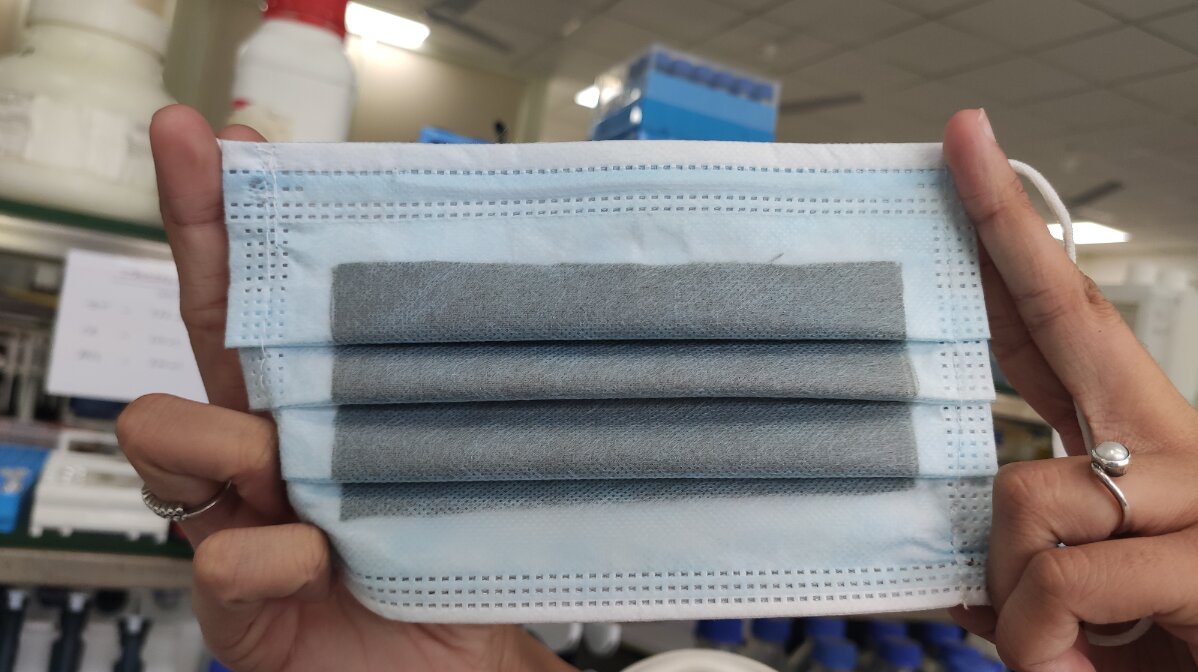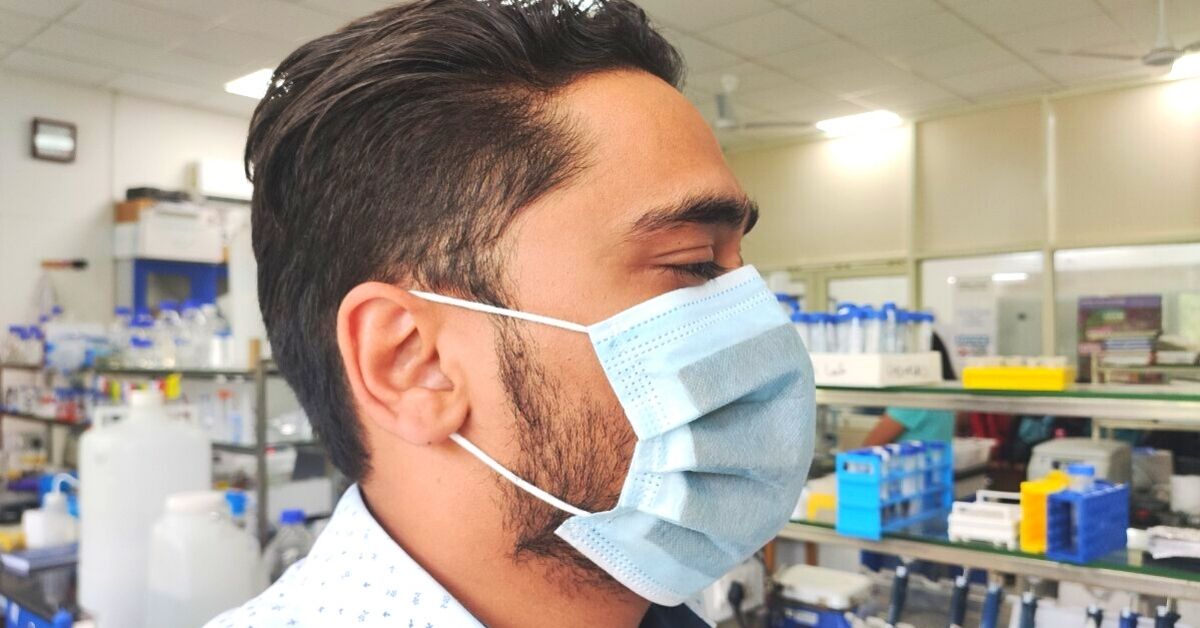With India desperately struggling in the face of a devastating second COVID-19 wave, face masks have become an indispensable piece of apparel, especially in public spaces.
Although they are largely designed to act as a physical barrier between the wearer and the external environment, they must also act as antimicrobial agents to inhibit or kill pathogens.
This is particularly important in the case of reusable masks, which are preferable to single-use masks that create littering and secondary infections. In light of these circumstances, researchers at IIT-Mandi have developed a “virus-filtering, self-cleaning and antibacterial material” that can be used to make face masks and other protective gear.
In a press release issued earlier this week, Dr Amit Jaiswal, an assistant professor at the School of Basic Sciences, IIT-Mandi, said, “Keeping the urgency of the pandemic and cost-effectiveness in mind, we have developed a strategy to repurpose existing [personal protective equipments] PPEs, especially face masks, by providing an antimicrobial coating to these protective clothing/textiles.” The materials used are reportedly 100,000 times smaller than the width of the human hair “to confer antimicrobial properties to polycotton fabric”.
But what are these materials, you ask? The team at IIT-Mandi incorporated nanometre-sized sheets of molybdenum disulphide or MoS2.
“For the past couple of years, we have been exploiting the property of 2D nanosheets, especially molybdenum disulphide or MoS2 nanosheets, for different biomedical applications. Recently, the MoS2 nanosheet has emerged as an excellent antibacterial agent. In our previous study, we reported that MoS2 nanosheets exerts its antibacterial activity through combined action of membrane depolarisation, metabolic inactivation and ROS (Reactive Oxygen Species) generation in bacteria. This understanding encouraged us to exploit the antibacterial potential of MoS2 nanosheet for the fabrication of PPEs like face masks which could be of great help to society in times of a pandemic,” says Dr Amit Jaiswal.

Assisting Dr Jaiswal in this endeavour are research scholars Shouank Ray, Praveen Kumar and Anita Sarkar.
Shounak says, “When we studied these MoS2 nanosheets under an electron microscope, we saw them as thin flakes having sharp edges and corners. These sharp edges/corners make nanosheets behave like nano-knives that penetrate and puncture the membranes of bacteria and viruses. We utilise these MoS2 nanosheets in our study and deposited them on the surface of a cotton fabric. When we studied these cotton fabric under a scanning electron microscope we observed that the nanosheets were quite uniformly deposited on the surface of the fabric and the normal architecture of the fabric was not at all hampered.”
He goes on to add that the ‘nanoknife-modified’ fabrics “demonstrated excellent antibacterial activity even after 60 cycles of washing”. Thus ensuring less biological waste generation.
In addition to puncturing the microbial membranes, these nanosheets enable the process of disinfection when exposed to light.
Praveen explains, “These fabrics have excellent antibacterial properties. Further, when these nanosheets are exposed to sunlight, they absorb the energy of sunlight and convert it into heat. This is known as the photothermal effect. Our modified fabrics have excellent photothermal properties. When it’s exposed to sunlight, the surface temperature of the fabric rises up to 77° Celsius within 5 minutes, which results in elimination of more than 99% bacteria within just 3 minutes.”
Writing in the prestigious journal of the American Chemical Society–Applied Materials & Interfaces–the authors write, “Within 5 minutes of solar irradiation, all the MoS2-modified fabrics showed 100% killing of both E. coli and S. aureus.”
In other words, hanging out your masks in bright sunlight helps clean them and ensures that you can wear them again.
It’s imperative to note that improperly disposed of PPEs are a serious secondary source of transmission, and having reusable antimicrobial masks can help circumvent this risk.
“We redesigned the commonly available three-layered facemasks by introducing our MoS2 fabric as an additional layer of protective clothing. It was found out that the repurposed face mask was able to filter out 97% of aerosolised particles in the size range of 100 to 200 nanometres which is very important in preventing the transmission of SARS-COV2 which has a size of approximately 120 nanometres. Further, the breathability of the face mask was not affected. Also, the photothermal property of MoS2 nanosheet can be utilised for large scale disinfection of used masks before disposal by harnessing the energy of the sun,” says Dr Jaiswal.
He adds, “We also believe that the antimicrobial fabric developed in this study has the potential for the fabrication of screens, creation of isolation wards, quarantine cells and helps in isolating individuals who have come in contact with viruses or other pathogenic bacteria.”
The researchers claim to have also developed prototypes of a four-layered mask using their MoS2 modified fabric, which in addition to eliminating microbes and cleanable by sunlight, can also filter more than 96% of particles in the size range of the COVID-19 virus.
“We have demonstrated the applicability of our fabricated MoS2 modified fabric at the bench scale which needs a little more testing and optimisation before it can be taken to the commercial scale. Thus, presently we have not discussed with any of the face mask/ PPE manufacturers. We are open to discussing our material with industries/manufacturers. Presently, we have demonstrated the applicability of using a prototype. Having said that, the reported MoS2 modified fabric is very much scalable. This needs certain optimisation and a few industrial-scale equipments for their production,” says Dr Jaiswal.
The second wave of COVID-19 has created the need to develop better and well-equipped PPEs with in-built antimicrobial properties, better filtration efficiencies and reusability.
“In this regard, we developed a 2D nanomaterial (MoS2) modified poly-cotton fabric which is photothermally active and can be used to harness sunlight for disinfection of the material in addition to the bacterial membrane disruption ability of MoS2. Thus, this may provide a potential antibacterial PPE for medical and para-medical practitioners across the world who are working at the forefront of this battle against COVID-19. Further, the reusability of the MoS2-Fabric will also enable it to be integrated with homemade masks, thus providing some degree of protection from microbial pathogens,” adds Dr Jaiswal.
(Edited by Yoshita Rao)
Like this story? Or have something to share? Write to us: contact@thebetterindia.com, or connect with us on Facebook and Twitter.
If you found our stories insightful, informative, or even just enjoyable, we invite you to consider making a voluntary payment to support the work we do at The Better India. Your contribution helps us continue producing quality content that educates, inspires, and drives positive change.
Choose one of the payment options below for your contribution-
By paying for the stories you value, you directly contribute to sustaining our efforts focused on making a difference in the world. Together, let's ensure that impactful stories continue to be told and shared, enriching lives and communities alike.
Thank you for your support. Here are some frequently asked questions you might find helpful to know why you are contributing?

